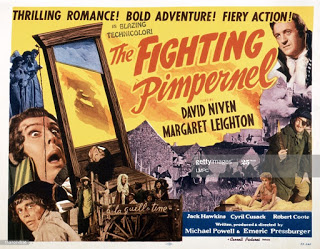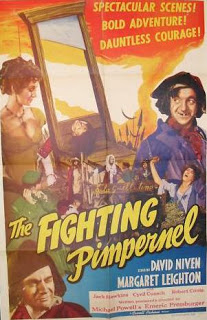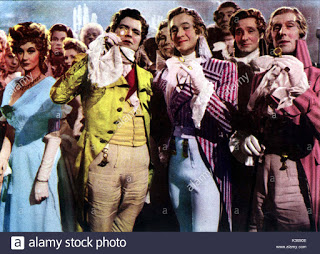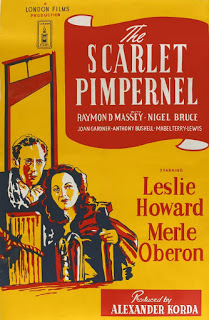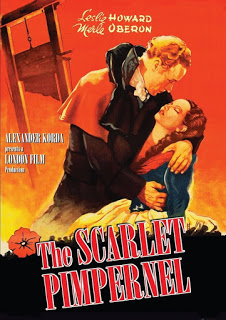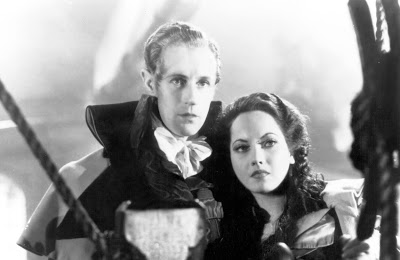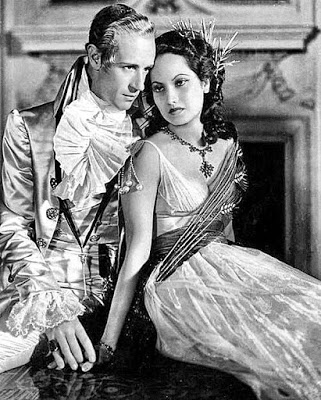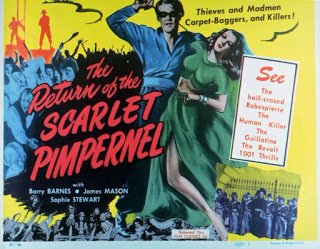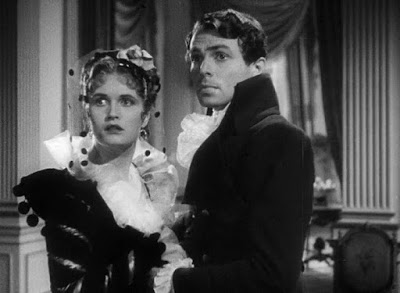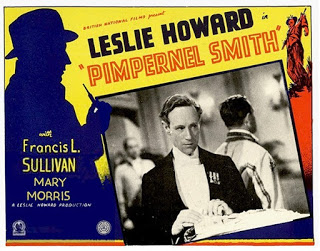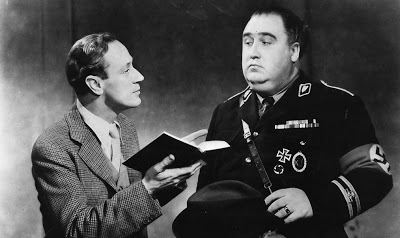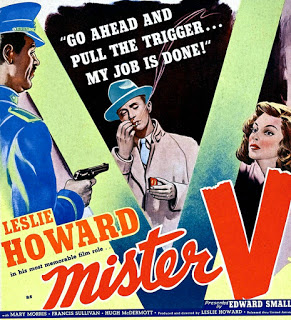Scarlet Pimpernel Films
In the order I watched them.
The Elusive Pimpernel (1950) - 5.5
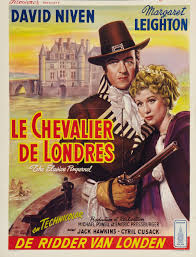
Aka - The Fighting Pimpernel
Films don't get much more English than this. Like Christmas pudding and a
reading of Dickens. A film about the great English literary hero (though
written by a Hungarian émigré) directed by the legendary team
of Michael Powell and Emeric Pressburger and starring David Niven and Margaret
Leighton. Leighton may be less known than those other names because she never
really tried for Hollywood but she was a famous actor on the stage and made
a few films in England. She also married Lawrence Harvey and Michael Wilding
(who had been married to Elizabeth Taylor). For all of this Leighton received
the CBE (Commander of the Order of the British Empire). Jolly good.
The story of the Scarlet Pimpernel is fairly well known. A few films had
already covered the character created by Baroness Orczy back in the early
20th century. She wrote a series of books but most of the film adaptations
only cover the first few books. The good old days of the French Revolution.
Heads rolling like bowling balls down an alley. Down with the aristocrats!
Swine. Parasites. Oppressors. But as an audience we are supposed to root
for the English aristocrat who saves them from the guillotine. Are they not
getting what they deserve? A study of French history would certainly say
yes. But it is a movie and the French aristocracy is long gone and most of
the British aristocracy are having to sell their homes to wealthy Internet
entrepreneurs, turning them into Airbnb's or giving guided tours. So we can
let that class conflict rest for now.
There is nothing particularly original here from Powell and Pressburger -
pretty much follows the lines of the 1934 version with Leslie Howard and
Merle Oberon - and even borrows some of the same dialogue as well as that
poem about the elusive Pimpernel - but it is beautifully shot and has a few
nice set pieces such as the ball thrown by the Prince of Wales (Jack Hawkins),
a race of carriages and the Pimpernel's clever Mission Impossible charade
that he pulls on the villain, Chauvelin (Cyril Cusack) who is after the Scarlet
Pimpernel in a few of the books. Niven is fine as both dandy and hero and
Leighton practically glows at times.
Not sure why, but IMDB has this at 1 hour 28 minutes while mine was 1 hour
43 minutes. Maybe the American vs the English version? At the same time there
are some very odd edits in the film that felt like a scene was cut out and
other scenes that did not add much to the film. Not one of Powell and Pressburger's
better films. In it for the money I expect.
The Scarlet Pimpernel (1934) - 8.0
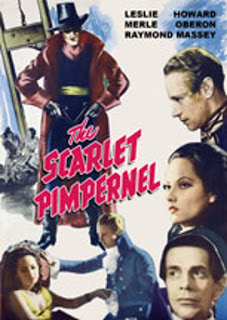
Watching the 1950 version (The Elusive Pimpernel) of this put me in the mood
to go back and look at what is considered the classic version of the story.
The Elusive Pimpernel which generally follows this one to the point of borrowing
some dialogue was alright but it felt lacking in emotion and had a jittery
narrative. Surprising in that it was directed by Powell and Pressburger while
this one was the feature debut of Harold Young, who went on to a career of
films that are long forgotten and fell into the second feature bin. I expect
while he was making this film he had producer Alexander Korda looking over
his shoulder with advice the entire time. But whoever was doing it, this
film gets everything right - the unspoken passion between the Pimpernel and
his wife is palpable, the emotional moments have grace, the costumes, the
sets are glorious and the story hums along with wit and adventure.
Korda had emigrated to England in 1931 (with his two brothers Zoltan and
Vincent) and was so grateful to have escaped from Hungary before the bad
times came that he had a lifelong love affair with the country of his adoption.
He produced or directed a number of classics with many of them an ode to
England such as That Hamilton Woman, The Four Feathers, Fire Over England
and this one. This must have felt dear to his heart about an Englishman saving
the lives of the aristocrats in France by getting them out. In the final
frame the Pimpernel stares ahead from the bow of his boat with his wife at
his side and exclaims "Look Marie, England" like a religious happening. Earlier
he had quoted from the Shakespeare play Richard King Richard II.
This happy breed of men, this little world,
This precious stone set in the silver sea,
Which serves it in the office of a wall,
Or as a moat defensive to a house,
Against the envy of less happier lands,--
This blessed plot, this earth, this realm, this England.
Korda had another reason to keep a close eye on this film production. He
had spotted a young actress who was going nowhere with a number of uncredited
roles in films. Merle Oberon. Born in Bombay to parents of Welch and Ceylonese
birth - which explains those fascinating dark eyes of hers - was working
in the studio cafeteria when Korda signed her and put her in The Private
Life of Henry VIII as Ann Boleyn. After this film Oberon headed for Hollywood
where she became a huge star but she later came back to England and married
Korda in 1939. She doesn't have to do much in this film but look beautiful
and despairing and she does it so well. The camera clearly loves her and
the look she gets when she finally realizes that her husband is the Scarlet
Pimpernel is one for the books.
Leslie Howard who I am generally indifferent to is perfect for this role.
The pampered frivolous parasite who gets more excited about cravats than
his wife, the man who dearly loves his wife but hates her as well and of
course as the Pimpernel who risks his life without a thought. Howard is not
a masculine actor but always gives out an aura of intelligence, plays mind
games with the French rather than using any physical skills. Rounding out
the threesome of the film is the great Raymond Massey as the dastardly Chauvelin
out to get the Pimpernel. The director uses the camera just right by often
shooting him from below the waist upwards capturing his menace.
In case you are not familiar with the story - that came from a long series
of books by the Hungarian Baroness Emmuska Orczy written in the early 1900s
- here is a quick summary. It is 1794 and the French Revolution is in full
swing, especially the guillotine with carts full of aristocrats being sent
to their death. The Scarlet Pimpernel and his men - all English aristocrats
as well - saves those he can but knows that he can only save so many. He
keeps his identity secret even from his wife Marie, a French actress, who
he doesn't trust for reasons that are misunderstandings. In his alter ego
as Sir Percy he is as the Prince of Wales (Nigel Bruce) tells him useless
but fun to have around. Chauvelin comes over to England as the Ambassador
but mainly to ferret out the true identity of the Pimpernel. He uses pressure
on Marie - her brother's life - to get her to betray the Pimpernel, not knowing
it is her husband. It is just an old fashioned black and white adventure
of a great story done very well.
The Return of the Scarlet Pimpernel (1937)
- 5.0
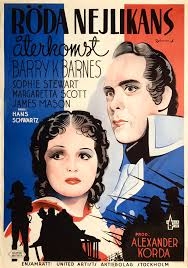
Three years after The Scarlet Pimpernel, London Film and Alexander Korda
are back with a sequel. But one quite lacking in charisma and star power.
I suppose both Leslie Howard, Merle Oberon and Raymond Massey were off in
Hollywood, but still who the heck are Barry Barnes, Sophia Stewart and Francis
Lister who took their places. Rather mystifying that Korda could not have
brought on bigger names than this. None of them have much heft and Stewart
in particular is just a blank space. The only name in the cast that I recognized
was James Mason as a wilting Frenchman who finally near the end gains some
spine and gives a speech which brings the house down. The ending of this
is so ridiculous that I wondered if I had walked into a comedy of the absurd.
There are two versions of this film - an 88 minute version released in England
and a 76 minute version in the USA. I saw the USA version so that could easily
have been the reason for my lackluster response to it - but an extra 12 minutes
would not have helped the acting.
It is still 1794 and the Reign of Terror continues in France. Robespierre
has become for all intents a dictator and is paranoid of all around him and
adding them to the list to be executed as quickly as he can. Chauvelin realizes
his head might be on the next list unless he can bring the Pimpernel to the
guillotine. Now of course the French know that the Pimpernel is Sir Percy
but Percy continues his charade of acting like a buffoon - I guess news travelled
slowly from France in those days. Chauvelin sets in motion a plan to kidnap
Percy's wife and use her as bait in France. And as you might expect the Pimpernel
saves her and also manages to save France and drive Robespierre out of power.
All in a day's work. And in fact in 1794 in a scene similar to the film,
Robespierre was denounced in the French Assembly, the people turned away
from his bloody dictates and he was executed. Guillotined like so many before
him. After Robespierre and his Jacobins lost power and many their heads,
the Girondists came to power and the executions continued. More work for
the Pimpernel!
Orczy was an interesting person. Born in Hungary in 1865, she moved to London
with her parents when she was 14. She was approaching 30 when she married
an Englishman and they remained married till death. They had no money so
she turned to writing, a failure at first, a few mystery short stories and
a short story about an Englishman who saved lives in the French Revolution.
She and her husband turned it into a play and it was an enormous hit as were
her 17 other (written out of chronological order) Pimpernel books. One of
the first if not the first author to create the now so common secret identity
of opposite personalities - one heroic, the other cowardly. Batman, Superman
and others all owe a debt of gratitude to this woman. She died in 1947 and
so got to see her creation make it to the screen many times.
Pimpernel Smith (1941) - 8.0
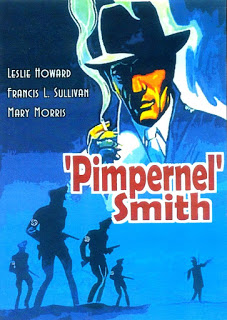
AKA - Mister V (title in America)
The English managed propaganda better than anyone else during WWII. Whether
the short films from Humphrey Jennings that quietly spoke of English life
and English determination or the many war films of grit and courage under
fire or a Mrs. Miniver or just a simple film like this shot in England during
war time. It is primarily an adventure film which saves its message of humanity
and human dignity till the end making it all the more powerful. So powerful
in fact that it is said that after seeing this banned film in Sweden Raoul
Wallenberg said "this is what I must do" and went on to save thousands of
Jews in Hungary. This was also one of Churchill's favorite films and the
one he played on the secret sea voyage to meet with Roosevelt to bolster
the spirits of his men. The United States was not yet in the war. but they
would be within six months. As the Scarlet Pimpernel quoted a poem of England
in the 1934 film, so does he in this one - from Rupert Brooke:
"If I should die, think only this of me: That there’s some corner of a foreign
field That is forever England." He was in fact buried in Greece during WWI.
With England at war, Leslie Howard returned to his home country to produce
and direct this updating of the character he made famous in the 1934 Scarlet
Pimpernel. The film takes place in spring 1939 before the invasion of Poland
but Germany is already busy sending Jews and intellectuals to camps and a
mysterious Englishman is helping some of them escape to freedom. Back in
England an eccentric and absent-minded professor of archeology is organizing
some students in his class to go on a field trip to Germany to do some digging.
Sort of a Mr. Chips type. No women in his life other than a statue of Aphrodite
that he uncovered. This is Mr. Smith (Howard) as self-effacing and modest
as only a British hero can be. He is of course the modern Scarlet Pimpernel.
When asked why he risks his life he answers, what else can I do?
It is a wonderful film that does not run out of steam in its 2 hour running
time. It has its derring-do but most of that is off-screen - this is more
cat and mouse - and what it also has is an enormously effective and charming
performance from Howard. I have newfound respect for his talent after this
and the Scarlet Pimpernel. In Gone with the Wind and Petrified Forest I found
him a bit too genteel but here he gets the balance just right. The film is
not as dark as I might be making out - lots of wit and droll humor - as it
keeps it light until the end. The German Chauvelin here (the very large and
rotund Francis Sullivan) is declaiming to an assistant - the English secret
weapon is their humor. I am trying to understand it by reading Wodehouse
and Alice in Wonderland. But it is not funny. And perhaps that is partly
why they lost the war.
"You will never rule the world. Because you are doomed. You are doomed captain
of murderers. One day sooner or later, you will remember my words"
